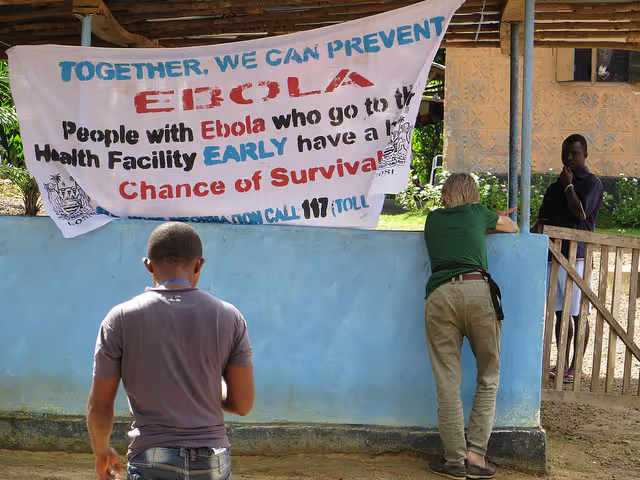Modelling Ebola in West Africa

Project overview
The study aimed to model data collected during the 2014 Ebola outbreak in West Africa to help track changes in the epidemiology; analyse the impact of different countermeasures; and estimate the impact of different approaches to treat patients and control the epidemic.
Project solution
This project offers [specific solution or intervention] to tackle [challenge]. By implementing [strategies, tools, or innovations], the project aims to achieve [desired outcomes]. The approach is designed to [specific actions or methods] to bring about meaningful change in [community, region, or issue area].
Expected outcomes
This project aims to achieve [specific outcomes], such as [measurable results, improvements, or changes]. The expected impact includes [benefits to the target community, advancements in research or innovation, or long-term effects]. By the end of the project, we anticipate [specific changes or milestones] that will contribute to [broader goals or objectives].
Principal Investigator: John Edmunds, London School of Hygiene and Tropical Medicine
Purpose
The study aimed to fit mathematical and statistical models to the epidemiological and clinical data that were being collected and collated by partner agencies during the 2014 Ebola outbreak in West Africa. In doing so, it has helped track changes in the epidemiology; analyse the impact of different countermeasures; and estimated the impact of different approaches to treat patients and control the epidemic.
Outcomes
The study developed a number of mathematical models of the spread of Ebola in West Africa and fitted these to emerging data using Bayesian methods. These models were used to inform a variety of decisions in real-time, and to evaluate the effectiveness of various interventions. The models and analyses, which were distributed widely to partners, were also used to help plan clinical trials more efficiently (in particular vaccine trials).
A series of district-level models were also developed (both deterministic and stochastic) to estimate the impact of Ebola treatment centres (ETCs) and Ebola Community Units (also known as Community Care Centres). The project further developed the model to assess the impact of the expansion of treatment beds in both Liberia and Sierra Leone.
Key Findings:
- Impact of Ebola Community Units - Real-time models were used to help plan for how many treatment unit and community care centres might be required to limit the spread of the epidemic.
- Evaluate changes in incidence and Case Fatality Rate (CFR) - These were tracked over time and across different geographical and organisational stratifications (e.g. by treatment unit). The study also correlated CFRs with underlying characteristics of the patients, e.g. age, sex, delay between onset and hospitalisations.
- Develop and parameterise a real-time spatially explicit meta-population model - The research developed and parameterised a real-time spatially explicit meta-population model in which individuals could spread infection to others within their district (=prefectures or counties) or neighbouring districts. The model was fitted to the weekly incidence data on EVD and took account of under-reporting of cases and changes to the reproduction number over time.
- Analyse individual-level data on previous EVD outbreaks from DRC - Data was compiled and analysed from all previous EVD outbreaks recorded from the Democratic Republic of Congo. These analyses and the full anonymised datasets were published and made freely available
- Impact of Socio-cultural factors on disease spread – the study attempted to collect data on operational and behavioural variables, in order to correlate these with changes in the EVD reproduction number.
Key outputs:
- Weekly reports and projections: http://ntncmch.github.io/ebola/
- Two-day modelling symposium held at LSHTM: https://sites.google.com/site/ebolamodelling/
- 11 peer-reviewed publications (See full details below)
[.slimline-cta-box][.slimline-cta_heading]R2HC Funding for Ebola Projects. A Rapid Response[.slimline-cta_heading][.slimline-cta_paragraph] In August 2014, the Ebola Outbreak in West Africa was declared an International Health Emergency by WHO and within a couple of weeks ELRHA launched a rapid-response call for research to combat the crisis. The UK Department for International Development (DFID), the Wellcome Trust and ELRHA opened a special funding window through the Research for Health in Humanitarian Crises (R2HC) programme.
The aim of this emergency call was both to produce robust research findings that could contribute to the effectiveness of the response to the current outbreak and help to draw lessons for future outbreaks of Ebola and other communicable diseases. The projects funded will strengthen the evidence base for the Ebola response in topics ranging from diagnostics to anthropology, surveillance and disease control.[.slimline-cta_paragraph][.slimline-cta-box]
Project delivery & updates
Stay up to date with the latest developments from this project. Here, you will find details on what has been delivered, resources created, and regular updates as the project progresses. Access key documents, reports, and other materials to see how the project is making an impact.
Resources
Journal article
LEARN MOREJournal article
LEARN MOREJournal article
LEARN MOREJournal article
LEARN MOREJournal article
LEARN MOREJournal article
LEARN MOREJournal article
LEARN MOREJournal article
LEARN MORE